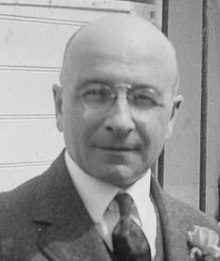ALEXIS CARREL MEMORIAL AWARD
Alexis Carrel (French: [alɛksi kaʁɛl]; 28 June 1873 – 5 November 1944) was a French surgeon and biologist who was awarded the Nobel Prize in Physiology or Medicine in 1912 for pioneering vascular suturing techniques. He invented the first perfusion pump with Charles A. Lindbergh opening the way to organ transplantation. His positive description of a miraculous healing he witnessed during a pilgrimage earned him scorn of some of his colleagues. This prompted him to relocate to the United States, where he lived most of his life. He had a leading role in implementing eugenic policies in Vichy France.
Carrel was a young surgeon in 1894, when the French president Sadi Carnot was assassinated with a knife. Carnot bled to death due to severing of his portal vein, and surgeons who treated the president felt that the vein could not be successfully reconnected. This left a deep impression on Carrel, and he set about developing new techniques for suturing blood vessels. The technique of "triangulation", using three stay-sutures as traction points in order to minimize damage to the vascular wall during suturing, was inspired by sewing lessons he took from an embroideress and is still used today. Julius Comroe wrote: "Between 1901 and 1910, Alexis Carrel, using experimental animals, performed every feat and developed every technique known to vascular surgery today." He had great success in reconnecting arteries and veins, and performing surgical grafts, and this led to his Nobel Prize in 1912.
During World War I (1914–1918), Carrel and the English chemist Henry Drysdale Dakin developed the Carrel–Dakin method of treating wounds based on chlorine (Dakin's solution) which, preceding the development of antibiotics, was a major medical advance in the care of traumatic wounds. For this, Carrel was awarded the Légion d'honneur. Carrel also advocated the use of wound debridement (cutting away necrotic or otherwise damaged tissue) and irrigation of wounds. His method of wound irrigation involved flushing the tissues with a high volume of antiseptic fluid so that dirt and other contaminants would be washed away (this is known today as "mechanical irrigation.") The World War I era Rockefeller War Demonstration Hospital (United States Army Auxiliary Hospital No. 1) was created, in part, to promote the Carrel–Dakin method.
Carrel co-authored a book with pilot Charles A. Lindbergh, The Culture of Organs, and worked with Lindbergh in the mid-1930s to create the "perfusion pump," which allowed living organs to exist outside the body during surgery. The advance is said to have been a crucial step in the development of open-heart surgery and organ transplants, and to have laid the groundwork for the artificial heart, which became a reality decades later. Some critics of Lindbergh claimed that Carrel overstated Lindbergh's role to gain media attention, but other sources say Lindbergh played an important role in developing the device. Both Lindbergh and Carrel appeared on the cover of Time magazine on 13 June 1938.
Carrel was also interested in the phenomenon of senescence, or aging. He claimed that all cells continued to grow indefinitely, and this became a dominant view in the early 20th century. Carrel started an experiment on 17 January 1912, where he placed tissue cultured from an embryonic chicken heart in a stoppered Pyrex flask of his own design. He maintained the living culture for over 20 years with regular supplies of nutrient. This was longer than a chicken's normal lifespan. The experiment, which was conducted at the Rockefeller Institute for Medical Research, attracted considerable popular and scientific attention.
A Nobel Prize laureate in 1912, Alexis Carrel was also elected twice, in 1924 and 1927, as an honorary member of the Academy of Sciences of the USSR
We Would like to dedicate this Summit after his name
Eligibility
- Junior Scientists or Researchses e.g. Associate Professor, Assistant Professo etc.) are the focus of this event.
- The topic must fit into scientific sessions of the conference.
- Each individual participant is allowed to submit only one paper (as first author or co-author).
- All authors should have senior position or faculty position.
- Participants should be below the age of 50 years and above 30 years.
- All submissions must be in English.
- Actively distribute information and promote the benefits of education and career matters.
Criteria for Selection
- Showcase your research through oral presentations and its impact to the Panel Member.
- Impact of the Research Work.
- Importance of the Research work to the socity.
- New Innovation in the Research Work
Awards & Rewards
- The Best 2 Researchers will be awarded with Alexis Carrel Memorial Award at the end of the conference
For Nomination Kindly write a mail to the Conference Secretariat at
[email protected] and kindly attached the below mentioned documents.
- Brief CV(Kindly mention atleast 2 reference)
- Abstact for his/her speeh during the summit.
- Last 2 Publication Research Work
- 1 Copy of HD Photograph
